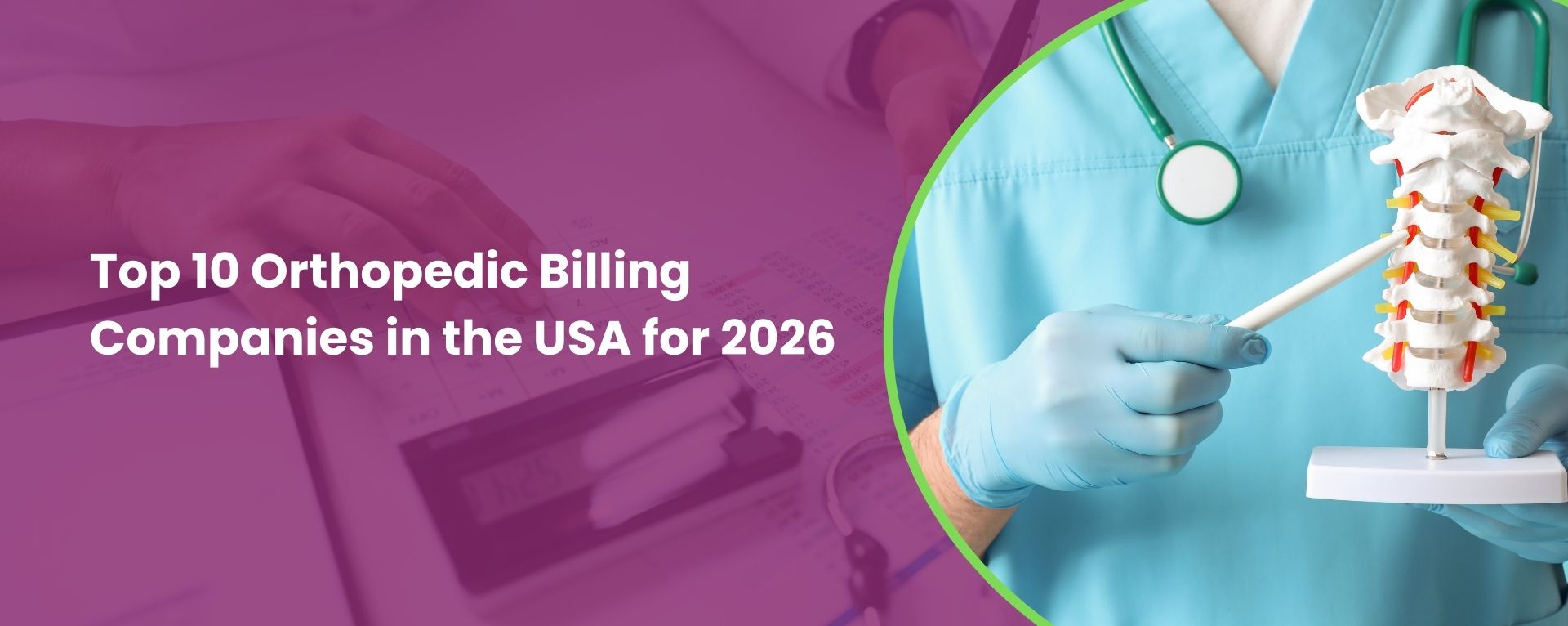Selecting the right electronic health record for your ambulatory surgery center billing is a big decision as it can significantly impact your practice’s financial success and smooth operation. It can cost you thousands of dollars monthly in denied claims if you choose an EHR that does not align with complex surgery coding demands and billing processes. You must understand that an ideal EHR does more than just store patient information; it helps manage complex specialty-specific surgery coding, ensures the correct use of modifiers, and streamlines the entire ASC medical billing process, including charge capture, coding, and claim submission.
On the other hand, ASCs rely on consistent reimbursements from Medicare, Medicaid, and private insurers to keep the practice running smoothly. That’s why an EHR that stays compliant with these regulations is crucial to avoid penalties and audits that can exceed up to a 5%-10% reduction in reimbursement rates over time. All these reasons make it mandatory for ASCs to choose the most reliable and efficient EHR for their practice. In this blog, we’ll discover the 5 best electronic health records for ASC medical billing to help you find the right one to keep your practice efficient and financially healthy:

Table of Contents
Toggle1. EPIC for ASC Medical Billing
EPIC is a household name in the healthcare industry, known for its comprehensive suite of tools that cater to both large hospitals and ASCs. With a reputation for being an all-in-one system, EPIC offers robust features tailored specifically to ambulatory medical billing services’ needs.
Strengths of EPIC for ASC Billing
- Comprehensive Integration: EPIC’s integrated system connects both clinical workflows and ASC billing services, reducing manual errors in data transfer. This is particularly useful for ASCs that need both accurate clinical documentation and billing for specialized procedures. For instance, after performing a knee arthroscopy, the CPT and ICD-10 codes are automatically generated, reducing the chances of errors in coding.
- Claims Management: One of the standout features of EPIC for ASC medical billing services is its claims management and denial resolution tools. With EPIC, ASCs can track denied claims, identify the reason for denials (e.g., incorrect modifiers or demographic mistakes), and take action to resubmit claims quickly. This enhances cash flow and reduces the time spent on unpaid claims.
- Real-Time Eligibility Verification: EPIC ensures that ASCs can verify insurance eligibility in real-time, ensuring that procedures are covered before surgery takes place. This reduces claim rejections due to lack of authorization, improving revenue cycle efficiency.
Drawbacks of EPIC for ASC Billing
- Complexity and Cost: EPIC is known for its complexity and higher price point. While it provides extensive features, smaller ASCs may find its setup and training requirements overwhelming. Compared to other EHR systems like AdvancedMD or eClinicalWorks, EPIC can be challenging to implement in smaller practices without dedicated resources.
- Customization Complexity: EPIC’s customization requires significant expertise, making it difficult for smaller practices to implement.
- Data Overload: EPIC generates vast amounts of data, making it challenging to extract actionable insights.
- Learning Curve: The system requires extensive training, which can delay implementation for smaller ASCs.
2. AdvancedMD for ASC Medical Billing
The cloud-based EHR system AdvancedMD is used by a lot of ASCs for medical billing services and the revenue cycle management company staff. It is made to meet the unique needs of ASC medical billing and is known for having an easy-to-use layout and many billing features.
Strengths of AdvancedMD for ASC Billing
- Integrated Billing and Scheduling: One of AdvancedMD’s top features for ASC medical billing is its ability to integrate scheduling and billing workflows. This eliminates the risk of mismatched codes or incomplete information. For instance, when a patient is scheduled for surgery, AdvancedMD automatically pulls in relevant billing details, including the associated codes for anesthesia and medical devices used during the procedure.
- Real-Time Charge Capture: In a busy ASC, automating charge recording could be the deciding factor. AdvancedMD charges are automatically captured in real-time once the procedure is complete; thus, not a single ASC will miss services that are potentially billable under AdvancedMD.
- Customizable Coding Tools: AdvancedMD offers customizable coding options, allowing ASCs to tailor CPT and ICD-10 codes based on the specific needs billing for ambulatory surgery centers. This flexibility is critical for ASCs that perform specialized surgeries and require precise billing for complex procedures.
Drawbacks of AdvancedMD for ASC Billing
- Learning Curve: While AdvancedMD is user-friendly overall, there can be a learning curve for staff unfamiliar with its features. Compared to systems like eClinicalWorks, which offer more out-of-the-box simplicity, AdvancedMD’s rich customization features might take longer to implement effectively.
- Cost: It can be expensive for smaller ASCs due to subscription fees, customization, and training costs.
- Technical Issues: Some users report slow performance or system glitches that can disrupt operations, but overall, it’s a reliable option for ASC medical billing.

3. eClinicalWorks for ASC Medical Billing
eClinicalWorks is one of the most flexible EHR systems, often preferred by ASCs because of its rich feature set and relatively low cost. It is especially suitable for ASC medical billing due to its cloud-based functionality and billing automation features.
Strengths of eClinicalWorks for ASC Billing
- Customizable Workflow: One of the best things about eClinicalWorks is that you can change how the process works. ASCs that do a variety of treatments, like surgeries on the intestines and the bones, can quickly change their EHR system to fit their billing needs. In this way, ASCs have full control over the processes for charging, coding, and billing.
- Automated Eligibility Verification: eClinicalWorks can check status in real time, which lets ASCs see if insurance covers surgery before it happens. This means that claims can’t be turned down because this information can be proven when the appointment is made.
- Automation Supported Claims Management: As part of its claims management system, eClinicalWorks helps ASCs find rejected claims and gives them the tools they need to quickly fix problems. For example, when a knee arthroscopy is rejected due to an error in coding, eClinicalWorks flags the claim and allows the ASC to take corrective action quickly.
Drawbacks of eClinicalWorks for ASC Billing
- Interface Complexity: Some users, especially those who are new to EHR systems, think that eClinicalWorks’ layout is more difficult to use, even though it can be changed in many ways. It might take longer to set up and train staff on eClinicalWorks than on AdvancedMD and Veradigm.
- Limited Reporting: The reporting functionality may not be as flexible compared to other products and thus necessitates additional work to prepare for customized reports.
4. Veradigm for ASC Medical Billing
Veradigm is another cloud-based EHR system that is gaining popularity among ASCs due to its easy integration and automated ambulatory services in medical billing processes. It has been designed to optimize revenue cycle management and is particularly beneficial for ASC medical billing services.
Strengths of Veradigm for ASC Billing
- Cloud-Based Flexibility: The cloud-based solution of Veradigm is ideal for multi-location practices or mobile surgical teams because it enables ASCs to access billing data from anywhere. For instance, if a patient undergoes knee surgery at one location, the staff at a different location can easily access the eligibility data or billing history of the patient from anywhere, which ensures hassle-free billing.
- Revenue Cycle Management Integration: Veradigm offers revenue cycle management. This is the integration of clinical workflows and billing systems into a single platform that reduces the possibilities of billing errors and ensures payment for all the services provided to the ASCs.
- Automated Billing and Payment Posting: Veradigm/Allscript also makes sure that claims are sent for both customers and doctors and that payouts are sent out as soon as possible. Posting will be done automatically by the system for patients and insurance companies to the corresponding procedure codes, thereby expediting reconciliation with the underpayment or overpayment flagged for correction.
Drawbacks of Veradigm for ASC Billing
- Limited Customization: While Veradigm offers a great deal of automation, some ASCs may find its customization options more limited compared to other systems like AdvancedMD or eClinicalWorks, which offer greater flexibility for highly specialized procedures.
- Limited Reporting Functionality: While it offers basic reporting, users may find the system’s reporting features lacking in depth or flexibility compared to other platforms like EPIC or AdvancedMD.

5. Greenway Health (Intergy) for ASC Medical Billing
Greenway Health (Intergy) offers an advanced solution for ASC medical billing services, integrating customizable workflows, real-time eligibility verification, and a cloud-based interface. This makes it particularly suitable for the needs of flexible yet efficient billing processes in an ASC.
Strengths of Greenway Health (Intergy) for ASC Billing
- Customizable Workflows: Intergy allows ASCs to create custom workflows for specific procedures involved in the process. For example, if an ASC specializes in cataract surgeries, the system can be tailored to automatically apply the correct CPT codes and billing steps for each step of the procedure, from pre-op to post-op care.
- Real-Time Eligibility Verification: Like eClinicalWorks, Intergy offers real-time eligibility verification to help ASCs confirm insurance coverage before the procedure. This ensures that your ASC medical billing team has the most up-to-date information, preventing claim denials later.
- Claims & Denial Management: Intergy provides tools to track claims and manage denials, similar to eClinicalWorks. It helps ASC medical billing services quickly identify why a claim was rejected, and what steps need to be taken to resolve it. This claim resolution system ensures that ASCs maintain a steady revenue flow by reducing delays.
Drawbacks of Greenway Health (Intergy) for ASC Billing
- Implementation Time: While Intergy offers a highly customizable solution, it may require more implementation time compared to simpler systems like AdvancedMD as it is best for large ASC centers. The initial setup and staff training may be more involved, especially for practices that don’t have dedicated IT teams.
- Data Migration Challenges: Transitioning from another EHR system to Intergy can be cumbersome, with potential data migration issues that can affect billing accuracy and operational continuity. One of AdvancedMD’s top features for ASC medical billing is its ability to integrate scheduling and billing workflows.
- The interface is inconsistent. It may not be intuitive compared to some other systems; thus, for new staff, or even others who are new to the system, there would be a steep learning curve.

Conclusion
When it comes to ASC medical billing, the five EHR systems discussed above which include EPIC, AdvancedMD, eClinicalWorks, Veradigm, and Greenway Health (Intergy)—each offer unique advantages based on the needs of the ASC. EPIC is an ideal choice for larger ASCs, as it excels in integrated workflows, robust claims management, and real-time eligibility verification, providing a comprehensive, large-scale solution.
On the other hand, AdvancedMD stands out for real-time charge capture, customizable coding, and scheduling integration, making it a perfect fit for both larger and smaller ASCs that need a user-friendly platform to optimize their revenue cycle management.
Whereas, eClinicalWorks shines with its customizable workflows and automated eligibility verification, offering flexibility for ASCs that need to tailor processes to their specific needs. Similarly, Veradigm excels in cloud-based flexibility and revenue cycle management integration, making it especially beneficial for multi-location ASCs or those with mobile teams.
Lastly, Greenway Health (Intergy) offers customizable workflows and real-time eligibility verification, making it a great option for ASCs that seek a flexible and tailored solution. Ultimately, the best choice depends on the size, complexity, and customization needs of your ASC practice. Each of these EHR systems has the potential to streamline ASC medical billing, reduce errors, and improve financial performance, helping practices manage their billing processes efficiently.
Frequently Asked Questions (FAQs)
How does an EHR improve the billing process in an ASC?
An EHR improves ASC billing by maintaining the entire revenue cycle process, from charge capture to claim submission. It can auto-generate CPT, ICD-10, and HCPCS based on the service provided, so the coding mistakes will be automatically minimized. With EHR, there is eligibility verification in real-time, decreasing claim rejections for lack of authorization, ensuring all billable services are caught in real-time, improving billing accuracy, and hastening the reimbursements process.
How much does an EHR system for an ASC cost?
What affects the amount an EHR system costs mostly entails the features you need, the size of your ASC, and the kind of option you would like-on-premise or cloud-based. There isn’t much cost for setting up cloud-based solutions, and the monthly fee in respect to each person starts at $300 and goes to $1,200. Larger, more complicated systems like EPIC cost more to set up and keep up to date. It’s important to factor in training, support, and potential customization costs.
Can the EHR system I use in my ASC integrate with the other tools I already have?
There are a lot of EHR systems that can work with other programs, like image software, office management tools, and financial management systems. However, integration capabilities can vary by vendor. EPIC, for example, is known for its strong integration features with other systems, while some smaller EHR platforms may have more limited integration options. Be sure to discuss integration needs with the vendor before purchasing to ensure compatibility with your existing software.









